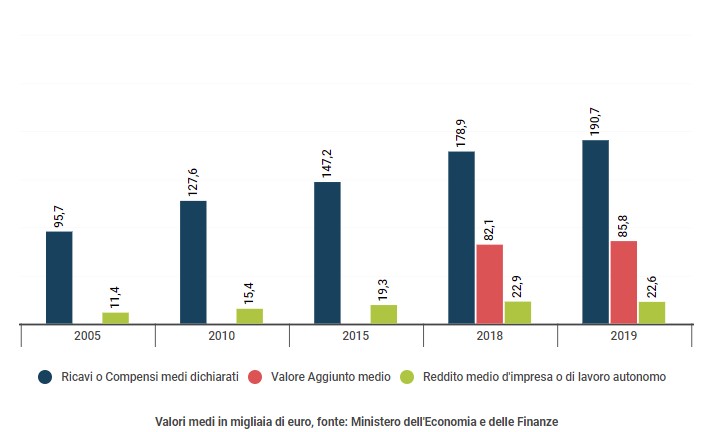How much are beach concessions worth for taxes?

How many state maritime concessions there are and how much they invoice in Italy. The Truenumbers article
The tenders for the management of state concessions, not only maritime but also river and state property, should have started on 1 January 2023, but on 8 February 2023 the majority parties found an agreement to postpone this deadline to 2024. Now it seems like the right time, especially after the letter that the President of the Republic, Sergio Mattarella, sent to the government requesting not only tenders for state maritime concessions but also tenders for the concession of spaces for street vendors .
Regarding the tenders for maritime concessions, it is obvious that those who currently manage the plants will also be able to participate. Indeed: they will have a higher score than those who participate for the first time to take into account the investments made, experience and technical management skills.
The Bolkenstein Directive
The Bolkenstein Directive is a cornerstone of European legislation in the field of the free market and competition within the EU and is the one that regulates the performance of activities linked to private services in individual States which, barring particular exceptions, must also be able to be the prerogative of businesses and professionals from other EU countries.
Maritime state concessions in Italy
In Italy, a country with 8,300 km of coastline, it is known above all for the rules regarding seaside concessions which, according to the same directive, concerning a limited state property, should be put up for tender and granted, precisely, for a limited time and not for decades as it happens now. Compliance with this European law would put many current owners of beach establishments out of business, favoring, according to Bolkestein's opponents, large groups, including foreign ones, and marking the end or downsizing of small, often family-owned, ownership that characterizes the sector today.
Italy has never applied the Bolkestein directive
And this is why although it was in 2006 that the directive was approved by the European Parliament and Council, after having been proposed by the Commission, so far in our country it has not actually been applied with reference to the beach concessions market. The various successive governments have always extended state maritime concessions, in violation of Bolkestein. Lately they have done so until 2034, as established by the 2019 Budget Law, a decision then confirmed by the 2020 Relaunch Decree but called into question by the ruling of the Council of State which obliges the sale of the bathing establishments through a public tender.
There are 29,689 state maritime concessions
These extensions were regularly condemned by the European Commission, which sent an infringement letter against Italy and generated clashes within the state administration, with the Competition Authority (Agcom) appealing against the Government , the TAR of Lecce which rejected this appeal and the Council of State which has just expressed its opinion. However, the conflict over maritime state concessions is naturally political and economic before being legal. And it also concerns the consensus of an important part of the tourism sector, which employs tens of thousands of people in Italy and involves, according to Unioncamere, 6,823 establishments, responsible for 29,689 concessions. It means that most of the factories hold more than one concession.
Each dealer has more than one concession
This trend is also confirmed by data from the Ministry of Economy and Finance, which however in the statistics on reliability indices speak of 5,709 establishments in 2019. More interesting than quantity, however, are the economic indicators that characterize these establishments. According to the Mef, before the pandemic, on average each of them had revenues of 190,700 euros, for an added value of 85,800 euros and a business income of 22,600.
How much do state-owned maritime concessions invoice?
And even more noteworthy are the statistics on how these economic performances have changed over time. In 2005, the first year for which data are available, the average turnover of each of the factories built on Italian state-owned maritime concessions was much lower, at 95,700 euros, for an income of 11,400. These are values almost exactly half of the most recent ones. It means that in 14 years earnings have doubled.
In terms of revenues, the increase was approximately 32 thousand euros between 2005 and 2010, and 20 thousand between 2010 and 2015, years characterized by an economic crisis that justifies this slowdown. After 2015, revenues accelerated again, increasing by more than 31 thousand euros between this date and 2018, and by as many as 12 thousand euros in just one year, between 2018 and 2019. And all this happened in the context of a also quantitative growth, i.e. in the number of bathing establishments.
Dealer turnover grew
The other economic, professional and commercial activities did not go as well. Overall, the average turnover of these grew by 32.2% in the 14 years between 2005 and 2019, and the business income by 36.4%. Of course, in this cauldron there is everything from catering services, which grew by 52%, to pharmacies, which instead experienced a decline. And yet it is significant that beach concessions are among the small group of activities that have experienced the most significant economic performances in a period that was not simple on an overall level.
The majority have an ISA score of less than 8
This, of course, taking for granted the truthfulness of the tax declarations, which as we know often, especially in the past , did not accurately reflect the real situation. The same MEF numbers say, in fact, that the majority of beach establishments have an ISA (Synthetic Reliability Index) score of less than 8. The ISAs are indicators constructed by the Revenue Agency through statistical and economic methodologies that measure the consistency of the data provided by companies and professionals and therefore also their degree of transparency and reliability. Those who obtain a score above 8 can join a reward scheme. And only a minority make it.
Are the dealers' statements reliable?
The seaside sector is no exception, with 3,363 state-owned maritime concessions with a turnover exceeding 30 thousand euros and 142 with a lower turnover. This is 61.3% of the total. It is not surprising that in the larger bathing establishments and with Isa higher than 8 the revenues are on average higher, i.e. 233,800 euros, compared, for example, to the 16,400 of those few in which neither 30 thousand per year nor this is reached. Isa level.
Dealers who pay less than 2,500 euros in license fees
These numbers must be compared with those of the costs incurred, and among these in particular those of the concession fees paid. Which even going back decades are particularly low. In a letter to the Prime Minister in February, Agcom underlines that of the 29,689 concessions, 21,581 paid less than 2,500 euros per year. Among these there were therefore also those won at the time by those establishments with a turnover of 200 thousand euros and more.
Overall, the Competition Agency always calculates, the state revenue collected thanks to these fees was 115 million euros. A negligible figure compared to the estimated turnover of the sector, which for Nomisma would reach 15 billion including the very large black market.
The State collects very little from maritime state concessions
Furthermore, the fees are often not regularly paid and there are 235 million still to be collected, dating back to the years between 2007 and 2020. It seems clear that if the maritime state concessions were put up for sale via auction to the highest bidder, the State could obtain higher rents, more consistent with the income of establishments which in some areas of Italy, for example in Sardinia, on the Costa Smeralda, are true luxury resorts.
The reform of maritime state concessions
After the pronouncement of the Council of State, the European Court of Justice is also likely to intervene. But an overall reform is also expected which will put an end to an embarrassing controversy for Italy at community level and which leaves operators in the sector in uncertainty. But obviously there is no agreement between parties and trade associations on how the problem could be resolved, with the organizations representing businesses asking that in any case there is no derogation from the last extension, until 2034, as established by the legislator with modification of the decree of 19 May 2020, n. 34.
Because beach concessions don't invest
What is certain is that the great fragmentation of the ownership of bathing establishments and the impossibility of a change in management is at the basis of the lack of investments that has also occurred in this sector and in the tourism sector in general. Both because such low fees do not lead to undertaking new projects that can increase the added value to repay them, and above all because those in charge of the concessions are small companies with limited capital available.

This is a machine translation from Italian language of a post published on Start Magazine at the URL https://www.startmag.it/economia/concessioni-demaniali-balneari-tasse/ on Sun, 14 Jan 2024 06:51:38 +0000.
